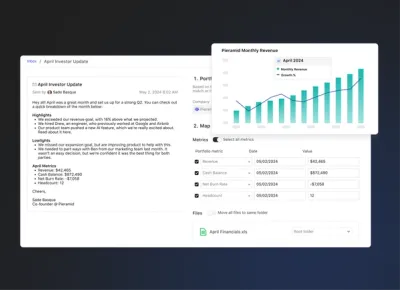
How to Effectively Find + Secure Angel Investors for Your Startup

Generally, we discuss what it takes to raise venture capital on the Founders Forward blog. However, there are a number of other types of investors and capital. All of which serve different purposes and can help different businesses in different ways. Angel investors are an integral part of the “startup ecosystem” and can be a valuable source of capital to take your business to the next level. So how do you find an angel investor for your startup?
What is an angel investor?
Both angel investors and venture capitalists offer a form of equity financing but there are a few key differences that will help you determine if you should approach angel investors. The main difference is where their capital comes from.
An angel investor is generally a wealthy individual who is looking to invest spare cash in an alternative investment. On the flip side, a venture capital firm is backed by limited partners who are expecting substantial returns in a certain period of time. This means that an angel investor may have alternative motives (personal interest in the problem, product, founders, etc.) whereas a venture capital firm is focusing on maximizing their returns.
With the different expectations in returns also comes a difference in check size and resources. An angel investor will typically write a check for anywhere from $1,000 to $100,000 (maybe more in some cases). As for venture capitalists, they will likely write a check from $100,000 to $5M+. If you’re not growing at hypergrowth speeds or do not need a huge check to grow your business, angel investors are likely a great option for your business.
However, smaller checks are not necessarily a bad thing. As Kera DeMars of Hustle Fund puts it, “it’s often easier to convince a bunch of people to write small checks rather than a few people to write huge checks.”
Recommended Reading: The Understandable Guide to Startup Funding Stages
Angel Investors vs. Venture Capitalists
VC funds are often organized under the limited partnership (LP) model. They raise large sums of money from institutions – such as pension funds, endowments, and family offices, then invest that money in exchange for a share of the return & management fees (see this excellent article by Elizabeth Yin for a deeper explanation on how VC’s make money). This gives them incredible leverage and financing power, but often leaves them under the watchful eye of LP’s who want a return on schedule.
Angel investors usually operate under a different model. Most tend to be high net worth individuals, and in many cases have built and exited a company themselves. They need to be accredited investors who can stomach the inherent risks involved with early stage startups.
Because angel investors tend to have smaller sums to invest than VC funds, you’ll often find them in Pre Seed and Seed rounds. VC’s tend to participate across all rounds, but typically only they can afford to play the game in Series B and beyond, as the shear amount of money required tends to be out of the range of most angels.
Recommended Reading: Venture Capitalist vs. Angel Investor
Step-by-step guide for finding and securing angel investors
Considering the wide range of people who can be angel investors and their check sizes and interest there are many ways to find and approach angels. Here are a few of our favorite approach to finding angel investors:
1. Ask friends and family first
As Elizabeth Yin writes, “There are lots of rich people worldwide — they don’t even have to be super rich. There are lots of angels who can write you a $1k-$10k check. Angels may not know they are angels. It’s your job to plant the seed in their heads that you are open to an investment from them!” When searching for angel investors it is generally best to start with the people already in your network.
2. Tap into your personal and professional network
Don’t be afraid to ask someone in your network for an introduction. Past co-workers or investors likely have their own professional network and can open doors to new potential investors. Part of raising angel capital is stepping out of your comfort zone, and as Elizabeth Yin puts it, “embracing the awkward.” If someone in your network passes, quickly move on to the next opportunity instead of wasting time continuing to pitch someone who passed.
Related Resource: Top 6 Angel Investors in Miami
3. Signup for an account with Angelist
Angel investors tend to network and create their own communities. One quick way to find angels outside of your immediate network is to turn to the internet to hunt down angel groups A slightly different approach is to find a syndicate. As AngelList defines it, “a syndicate is a VC fund created to make a single investment. They are led by experienced technology investors, and financed by institutional investors and sophisticated angels.” AngelList is a great source for finding syndicates and angel groups.
Related Reading: How To Find Private Investors For Startups
4. Join the Angel Capital Association
As written on their website, “CA is a professional society of accredited angel investors who make up the world’s most prolific early-stage investment class. The association is the largest professional development organization for angel investors in the world deploying more than $650 million in early-stage capital each year. ACA provides an insider perspective that can help you make smart investment decisions.”
Learn more about Angel Capital Association and the perks for founders here.
5. Leverage social media
Many investors spend time on social media — especially Twitter and LinkedIn. You can leverage social channels to get in front of angel investors. Investors typically need multiple data points to make an investment. By interacting on social media, you’ll be able to build up those “data points” so when the time comes to raise they will already be familiar with you and your business.
Who can become an angel investor?
Just about anyone can be an angel investor. Typically speaking an angel investor has to be an accredited investor. As Investopedia puts it, “to be an accredited investor, a person must have an annual income exceeding $200,000, or $300,000 for joint income, for the last two years with the expectation of earning the same or higher income in the current year.”
One of the interesting aspects of raising angel capital is that everyone around you has the chance to be an investor. With the introduction of equity crowdfunding (more on this later) the scope of angel investors has been opened even further.
What do angel investors look for?
Angel investors can be interesting because they may not be motivated purely by returns. Sometimes angel investors are attracted to a market, a personal interest, or even just want to back a friend or family member.
With that being said, it is still vital to be able to portray that you are building a sustainable business that can generate returns and compete with their other investments. At the end of the day, an individual investor has countless options for where they should invest their money. You need to be able to paint a picture of why they should allocate their money in your business as opposed to public markets, real estate, and other traditional investment opportunities.
ROI
Like most investors, angels are looking for a return on their investment. Motives might differ than a traditional venture capitalists, but at the end of the day they’ll want to see how they can make a return on their investment.
A reliable leadership team
Angel investors want to know that they are investing in a reliable leadership team. This means they will properly communicate, lead, and build their startup.
Early growth and traction
If an angel wants ROI, they’ll want to see that you have the data and business plan to generate returns. Like VCs, angels will use data and traction to make their investment decision.
A scalable and effective business plan
Also going hand-in-hand with generating a return, is a scalable business plan. Angels will want to understand how your business scales and what it looks like at different points in the future.
How much do angel investors typically invest?
The typical investment amount from an angel investor varies quite a bit. Angel investors will invest anywhere from $1,000 to $1,000,000+. However, the average check size hovers around $25,000 to $100,000.
There are a few ways to approach the wide range in check sizes. On one hand you can talk to as many angels as possible and pick up smaller checks to build your round. This obviously can be more time consuming and requires you to keep more stakeholders in the loop. However, it is generally an easier decision for someone writing a $5,000 check as opposed to a $100,000 check.
On the flip side, you can target a couple of larger angel investors and spend your time targeting a few large checks to close your round.

What are the benefits of angel investors?
Angel investors can often play a role in providing crucial company-building guidance in the early days. Because they tend to arrive on the scene early, they stand to make a massive return if your company succeeds. VCs can be equally helpful, and they’ll sometimes place a member of their fund on your board who can assist in guiding the direction of your company. Check out some of the benefits of raising from angel investors below:
- Build momentum during a raise — angel investors can be a great first check and help build momentum during a fundraise
- Introductions to other investors — angel investors tend to know other individuals that might be willing to invest in your company or help in key areas
- Silent investor — some angel investors tend to be more hands-off than VCs (which can be a pro or con depending on your business.
How to pitch angel investors
If you can find an angel investor that fits in with your company ethos they can be incredibly valuable for you as an advisor and source of capital.
Check out how Jonathan Gandolf, CEO of The Juice, found warm intros to potential investors below:
Find Their Motivation
As we mentioned earlier, often times angel investors have an alternative motive outside of profit. A lot of the time they may be investing because of the founders, a personal interest in the problem, or an interest in the market/business model. With that being said, it is important to tailor your pitch to what motivates your angel investors. A pitch to a venture capitalist often times will focus on the economics and ability to create returns but a pitch to an angel investor may differ quite a bit.
Iterate Your Pitch
You’ll want to be sure to iterate on your pitch for each angel investor. After your first meeting if you find they have an affinity for your founding team, you may want to build your pitch around the team. If you find they have a personal interest in the problem you are solving, build your pitch around your solution. Note: is vital to let angel investors know the risks associated with backing a “startup.” This is especially true if it is their first time investing in a private company.
Provide Status Updates
Angel investors are ultimately risking their own money for your business and it is your duty to keep them involved throughout the process. It does not have to be an in-depth dive into your business start by sending them status updates during and after your fundraise. We suggest including things like wins/losses, high level metrics, priorities, etc. Remember if your investor has a certain motivation behind their investment feed into that when updating them. If they have experience in the market or field you may want to make specific asks where they are qualified.
Keep your investors up to date with Visible
Once an investor writes a check it is your responsibility to keep them engaged with your company. At the end of they day they should be the ultimate evangelist for your company so it is vital you communicate and have a transparent relationship. Depending on their check size and involvement with the business will dictate how much you should share with them.
However, if it is someone that wrote a smaller check size it may make sense to send a less involved Update. This allows you to keep them in the loop but avoid the additional questions and confusion that may come with sharing too much information. In a “lighter” version of an Update we’d suggest sharing a couple key things:
Major milestones — share your big wins from the past quarter. This can be a new customer, round of funding, or just anything you are proud of.
Where you need help — let angels know where they can be of help to your startup. Don’t be afraid to ask for introductions to customers, potential hires, and other investors.
Key Metrics — share 1 or 2 of the key metrics behind your business. They should already be familiar with these metrics and should not come as a shock when they see a chart.

Not all investments are created equally. Do you want an investor that will write you a check and leave you alone? Are you interested in ‘smart money’ that will help you build your company? Do you want mentorship in exchange for a board or advisory seat? No one can answer these questions for you, but it’s important to keep it them mind when evaluating the pros & cons of angel investors vs venture capitalists. Fundraising is one of the hardest jobs in the world – you should try to make it worth it.



